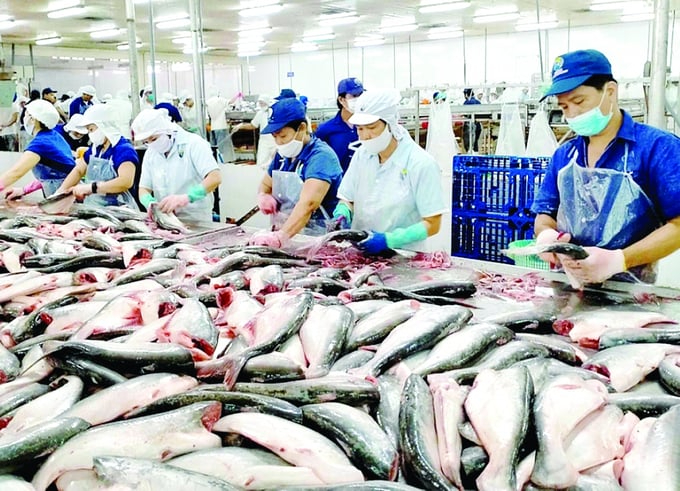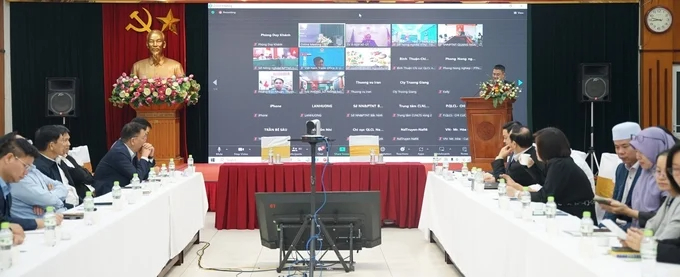May 24, 2025 | 16:20 GMT +7
May 24, 2025 | 16:20 GMT +7
Hotline: 0913.378.918
May 24, 2025 | 16:20 GMT +7
Hotline: 0913.378.918

Middle Eastern countries have a great demand for seafood and agricultural products. Photo: TL.
This data was unveiled during the Discussion on "Facilitating Exchange of Information on Market Demands and Dissemination of Agricultural Regulations in the Middle Eastern and African Markets," hosted by the Department of Quality, Processing, and Market Development on November 24.
Mr. Ngo Xuan Nam, Deputy Director of the SPS Vietnam Office, presented a comprehensive report on SPS measure changes from major exporting markets. According to the report, from January to October 2023, significant exporting nations such as Japan (120), Canada (111), EU (103), and the US (80) collectively accounted for approximately 10% each of the total 1,000 announcements. In contrast, the Middle East and Africa contributed only 158 announcements, equivalent to about 15% of the overall changes in SPS measures reported by WTO members during the same period.
Nam emphasized that these statistics underscore the stability of SPS measures in the Middle East and Africa, thus it is uneasy for exporters to respond effectively to requirements. This observation serves as a crucial point of consideration for those engaged in trade exchange with these countries.
The representative of the Department of Quality, Processing, and Market Development highlighted that while the Middle East and Africa serve as niche markets for Vietnamese agro-forestry-fishery (AFF) products, they play a significant role. To succeed in these markets, Vietnamese AFF products must adhere to specific requirements related to product standardization, production processes, and other criteria, ensuring competitiveness against neighboring countries with similar offerings.
Diverse regulations on food safety and SPS measures exist within the regions of the Middle East and Africa. Nevertheless, Vietnamese agricultural products entering these markets must particularly focus on obtaining "Halal certification," a pivotal keyword in ensuring market access.
Nam further explained the unique importance of these markets for Vietnamese agricultural products. In 2023, Vietnam signed its first Free Trade Agreement (FTA) with Israel, with negotiations ongoing for an FTA with the UAE. These agreements are expected to create opportunities for Vietnamese agricultural products to gain a stronger foothold in the region. Additionally, Vietnam has signed the African Continental Free Trade Area (AfCFTA), eliminating most tax barriers and streamlining food safety and disease safety requirements.

Seminar "Connecting information about needs, tastes and disseminating agricultural market regulations in the Middle East - Africa region" was organized by the Department of Quality, Processing and Market Development on November 24.
Middle East, comprising 16 nations and a population of 400 million, primarily directs Vietnamese agri-food exports to the Gulf Cooperation Council (GCC) member countries. The African market, with 45 out of 55 countries participating in the WTO, gradually removes non-tariff barriers and reduces export tariffs, facilitating entry for Vietnamese goods.
Highlighting specific markets, Mr. Tran Trong Kim, First Secretary in charge of the Vietnam Trade Office in Saudi Arabia, emphasized the substantial demand for agricultural and Halal food products. Despite stringent regulations, there is significant potential for Vietnamese exports, with Saudi Arabia welcoming Vietnamese seafood and agricultural products.
Saudi Arabia, with stringent regulations overseen by the Saudi Food and Drug Authority (SFDA), necessitates registration and approval for agricultural and food products. The sector's goal is to ensure the safety of food and feed, pesticides, and promote smooth commercial traffic while maintaining consumer confidence in food control authorities.
According to the SPS Vietnam Office, the Ministry of Agriculture and Rural Development (MARD) has made progress in exporting seafood and agricultural products to Saudi Arabia, engaging in regular exchanges to address export challenges.
Providing insights into the UAE market, Truong Xuan Trung, Vietnamese Trade Counselor in the UAE, highlighted the country's high-income developing market economy with a growing population. Although agriculture contributes minimally to GDP, 80% of food and beverages are imported. Trung emphasized the importance of compliance with documentation requirements, such as the Halal Certificate, Origin Certificate, Phytosanitary Certificate, Customs manifest, bill of lading or delivery authorization, and Certificate of analysis for pesticide residues. While the UAE market is open with no commercial barriers, fierce competition among exporters suggests that enterprises should negotiate and adopt secure payment methods in their dealings with UAE enterprises.
In the first 10 months of the year, agricultural product exports to key market areas tended to decrease over the same period (Americas decreased by 20.6%, Europe decreased by 11.8%), and Africa alone increased by 21.6% and Asia increased by 5.7%. In particular, the Middle East and Africa are two large market areas with many countries and territories, are potential and promising markets, with large import demand for Vietnamese agricultural products, especially especially the food product group.
Translated by Dieu Linh

(VAN) In the tranquil wetlands of Van Long, there are quiet souls who guard the forests, nurture the waters, and oversee every bird and troop of langurs as protecting the essence of a living heritage.

(VAN) WWF, GIZ, IUCN, UNDP call for biodiversity conservation and sustainable development must be regarded as a unity in strategies for a green future.

(VAN) On celebration of International Day for Biological Diversity, Deputy Minister Nguyen Quoc Tri called for practical actions to address nature and biodiversity conservation.

(VAN) Dr. Hoang Thi Thanh Nhan – Deputy Director of the Nature and Biodiversity Conservation Agency – highlighted this on the International Day for Biological Diversity, May 22, 2025.
![Ho Chi Minh city adapts to climate change: [2] Accelerating action](https://t.ex-cdn.com/nongnghiepmoitruong.vn/608w/files/chiqk/2025/05/22/4024-4220-bien-doi-khi-hau-1-100626_766.jpg)
(VAN) Clearly recognizing the challenges posed by climate change, Ho Chi Minh city has swiftly shaped its policies and implemented practical solutions to adapt.

(VAN) Rice straw is no longer just a discarded byproduct, but it is becoming a green resource that helps farmers in the Mekong Delta reduce emissions and promote circular, sustainable agriculture.

(VAN) Other Effective Area-based Conservation Measures (OECMs) are solutions that contribute effectively to achieving the goals of the Kunming–Montreal Global Biodiversity Framework.